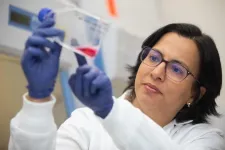(Press-News.org) As ocean temperatures rise, coral reefs face increasing threats as ecosystem damage has accelerated in recent decades. The ability to preserve and revive biodiverse coral samples has become an essential priority for the health and future of the world’s oceans.
A Texas A&M University-led interdisciplinary team of researchers demonstrated that live coral can be preserved through a new technique called “isochoric vitrification.” This process takes selected coral fragments through the stages of cryopreservation, then revival. The process allows the coral to be cooled rapidly to a temperature of -196 degrees Celsius — nearly -321 degrees Fahrenheit — without forming ice, which is lethal to coral and most biological matter.
“This work is an interdisciplinary collaboration that unifies the experts in coral preservation with experts in cryothermodynamics,” said Dr. Matthew Powell-Palm, lead author on the project. “It's this collaborative marriage of fundamental thermodynamic advancements and fundamental advancements in coral biology and husbandry that have enabled our breakthrough success in whole coral cryopreservation.”
The research team’s findings were published in Nature Communications. Alongside Powell-Palm, collaborators included Dr. Mary Hagedorn and Dr. E. Michael Henley of the Smithsonian’s National Zoo and Conservation Biology Institute (NZCBI) and Dr. Boris Rubinsky of the University of California, Berkeley.
Powell-Palm, an assistant professor in the J. Mike Walker ’66 Department of Mechanical Engineering at Texas A&M, and Rubinsky led the work to develop the isochoric vitrification technique. Hagedorn and Henley took the technique into the real world, applying it to preserve coral fragments at the Hawaii Institute of Marine Biology. The project was funded by the conservation organization Revive and Restore.
Year-Round Sampling
Previous methods of cryopreservation involved collecting coral reproductive matter while the coral reproduced, which was limited to a few days out of the year and in often difficult-to-access locations. Developing a technique not limited by the coral’s reproductive schedule makes it possible to extract and preserve coral throughout the year at any time.
To preserve the coral fragment without forming ice, researchers first bleached the sample — a process in which a symbiotic photosynthetic algae is removed from the coral. While in nature, bleaching is typically associated with overstress in coral and leads to starvation in the organism. However, it was discovered that by applying isochoric vitrification without bleaching, the algae created ice pockets. Once removed, the researchers could preserve the bleached coral fragment in a glassy state by introducing it to a chemical solution and storing it inside a specialized aluminum container that was then rapidly cooled using liquid nitrogen. The coral was then warmed and revived by reintroducing filtered seawater gradually over 20 minutes.
While the technique is scientifically sophisticated, Powell-Palm said one of its greatest strengths is the simplicity of the technology required to apply it.
“Compared to other emergent vitrification techniques — which frequently require lasers, electromagnetic implements or other high-tech laboratory equipment — our isochoric vitrification approach is exceedingly fieldable,” Powell-Palm said. “It requires no moving parts or electronics, and the protocol can be implemented by a field technician with no background in thermodynamics. This is essential to the practicality of any conservation technique because when this is deployed in real marine field stations, the high-tech lab infrastructure common to many laboratories will not be available. From a purely technological perspective, the technique is simple, rugged and ready for the field.”
Long-term survival
Looking forward, the researchers are working to reduce the stress placed on coral throughout the process. While the researchers successfully preserved and revived one species of coral, the life span observed was only up to 24 hours post-thaw. By reducing the overall stress placed on the coral, researchers hope to achieve long-term survival for subjects of the vitrification process and rapid deployment of the technique into real-world conservation efforts.
“Everyone benefits from the health of the world's oceans, be it by eating fish, living in a coastal community that benefits from reef-driven tourism, or simply enjoying a walk on the beach,” Powell-Palm said. “Coral reefs are essential to the baseline health of our oceans, and cryo-conservation of endangered coral species can help to ensure that these invaluable and marvelous organisms do not go extinct.”
Coral reefs are among the planet’s most diverse ecosystems and are vital in ensuring food security, protecting coastlines and serving as home to nearly a quarter of the ocean’s lifeforms.
By Steve Kuhlmann, Texas A&M Engineering
###
END
Ice-free preservation method holds promise to protect reefs
New cryopreservation technique shows a path toward year-round coral sample collection
2023-08-23
ELSE PRESS RELEASES FROM THIS DATE:
Editorial: A macrophage is a macrophage is a macrophage—in metastasis
2023-08-23
“We hope that these results will inform future attempts at anti-macrophage therapy and lead to better outcomes for patients in the not-too-distant future.”
BUFFALO, NY- August 23, 2023 – A new editorial paper was published in Oncotarget's Volume 14 on June 6, 2023, entitled, “A macrophage is a macrophage is a macrophage—in metastasis.”
In this new editorial, researcher Thomas T. Tapmeier from Monash University, Hudson Institute of Medical Research and University of Oxford discusses a recent study he co-authored on how lung macrophages evolve during metastatic growth of lung colonies in a mouse model of melanoma. Macrophages have important roles ...
Deforestation limits nesting habitat for cavity-nesting birds
2023-08-23
With an extendable pole fitted with a small camera, Alison Ke could get a clear view of the inside of a nest box, including one time when a small, green Pacific parrotlet laid eggs. Ke, who earned a Ph.D. in ecology from UC Davis, led a research project to find out how converting rainforest to farmland affects the habitat of birds who rely on tree holes, or cavities, for nesting.
Ke worked closely with local scientists and community members to study birds around the Mache-Chindul Ecological Reserve, an area in northwest Ecuador that has experienced rapid deforestation and agricultural expansion in the past 50 years. Their study, ...
Brain lesions associated with memory loss in multiple sclerosis linked to common brain circuit
2023-08-23
Between 30 to 50 percent of people living with multiple sclerosis (MS) will experience memory problems but the cause is uncertain. Brain lesions are the hallmark imaging sign used to diagnose MS and are often associated with memory dysfunction. However, increased MS brain lesions are not specific to memory problems and are also associated with fatigue, walking difficulty and other common MS symptoms. Previous studies that attempted to align the anatomy of lesions associated with memory problems in MS led to conflicting ...
2024 Hertz Fellowship application now open
2023-08-23
The Fannie and John Hertz Foundation, an organization dedicated to empowering the nation’s most promising innovators in science and technology, announced today that it is accepting applications for the 2024 Hertz Fellowship awards.
The Hertz Foundation has been granting fellowships to empower the nation’s most promising young minds in science and technology since 1963. Hertz Fellows receive five years of funding, which offers flexibility and freedom from the traditional constraints of graduate training and the independence needed to pursue research to advance our ...
Mayo researchers find vaccine may reduce severity of long-haul COVID symptoms
2023-08-23
ROCHESTER, Minn. — Getting a COVID-19 vaccine may not only reduce a person's risk of getting long-haul COVID, but also could mean fewer symptoms for people who develop the condition.
Mayo Clinic researchers discovered that long-haul COVID patients who were vaccinated before contracting the virus were less likely to experience symptoms such as abdominal pain, chest pain, dizziness, and shortness of breath, according to a study published in the Journal of Investigative Medicine. The study is believed to be among the first to examine COVID-19 vaccines' potential to reduce ...
MSU research suggests natural selection can slow evolution, maintain similarities across generations
2023-08-23
MSU research suggests natural selection can slow evolution, maintain similarities across generations
Highlights:
New research from Michigan State University suggests that natural selection, famous for rewarding advantageous differences in organisms, can also preserve similarities.
Reporting in the journals New Phytologist and Evolution, the researchers worked with a plant called wild radish and its stamens, or pollen-producing parts, two of which are short and four are long.
Roughly 55 million years ago, wild radish ancestors had stamens of equal length. The team selectively bred — or artificially selected — ...
New modeling method helps to understand extreme heat waves
2023-08-23
ITHACA, N.Y. - To prepare for extreme heat waves around the world – particularly in places known for cool summers – climate-simulation models that include a new computing concept may save tens of thousands of lives.
The concept, called “ensemble boosting,” uses computationally efficient modeling to simulate a large set of extreme but plausible heat waves, all while avoiding hundreds of hours of expensive calculations on large computers.
The study on the new modeling method, led by scientists at ETH Zurich, Switzerland and Cornell University, was published Aug. ...
Insurance data reveal that vasectomies are becoming more common in the U.S.
2023-08-23
In the wake of the 2022 Supreme Court ruling in Dobbs v. Jackson Women's Health Organization that overturned Roe v. Wade, researchers at the University of Chicago set out to investigate whether anticipation of restricted abortion access increased interest in vasectomies in the preceding years. In a new analysis, they found that vasectomy rates in the United States witnessed a remarkable surge from 2014 to 2021, as more men opted for the outpatient surgical procedure that offers permanent contraception by preventing ...
Researchers target lifecycle of parasite behind Chagas disease
2023-08-23
Almost everything about insects called kissing bugs is revolting, from the insidious way they bite people’s faces at night to drink their blood while they sleep to the way they spread disease through their poop.
Some carry a parasite called Trypanosoma cruzi that causes Chagas disease, a leading cause of disability and premature death in the Americas. Left untreated, Chagas disease can cause serious heart and digestive problems. It’s showing up more and more in patients in the United States.
Now researchers at the University of Cincinnati are investigating ...
Better or different? How brand differentiation affects pay and profits
2023-08-23
DURHAM, N.C. -- New research finds brands that leverage a reputation for quality to pay employees less risk eroding profits.
The paper, published online June 12 in the Journal of Marketing Research and authored by researchers from Duke University, London Business School and Texas A&M University, shows that vertical brand differentiation (being perceived as better) is associated with lower pay, whereas horizontal brand differentiation (being perceived as different) is associated with higher pay.
High-quality brands taking advantage of brand cachet to pay employees less erodes profits due to negative effects on employee productivity ...
LAST 30 PRESS RELEASES:
Scientists discover why we know when to stop scratching an itch
A hidden reason inner ear cells die – and what it means for preventing hearing loss
Researchers discover how tuberculosis bacteria use a “stealth” mechanism to evade the immune system
New microscopy technique lets scientists see cells in unprecedented detail and color
Sometimes less is more: Scientists rethink how to pack medicine into tiny delivery capsules
Scientists build low-cost microscope to study living cells in zero gravity
The Biophysical Journal names Denis V. Titov the 2025 Paper of the Year-Early Career Investigator awardee
Scientists show how your body senses cold—and why menthol feels cool
Scientists deliver new molecule for getting DNA into cells
Study reveals insights about brain regions linked to OCD, informing potential treatments
Does ocean saltiness influence El Niño?
2026 Young Investigators: ONR celebrates new talent tackling warfighter challenges
Genetics help explain who gets the ‘telltale tingle’ from music, art and literature
Many Americans misunderstand medical aid in dying laws
Researchers publish landmark infectious disease study in ‘Science’
New NSF award supports innovative role-playing game approach to strengthening research security in academia
Kumar named to ACMA Emerging Leaders Program for 2026
AI language models could transform aquatic environmental risk assessment
New isotope tools reveal hidden pathways reshaping the global nitrogen cycle
Study reveals how antibiotic structure controls removal from water using biochar
Why chronic pain lasts longer in women: Immune cells offer clues
Toxic exposure creates epigenetic disease risk over 20 generations
More time spent on social media linked to steroid use intentions among boys and men
New study suggests a “kick it while it’s down” approach to cancer treatment could improve cure rates
Milken Institute, Ann Theodore Foundation launch new grant to support clinical trial for potential sarcoidosis treatment
New strategies boost effectiveness of CAR-NK therapy against cancer
Study: Adolescent cannabis use linked to doubling risk of psychotic and bipolar disorders
Invisible harms: drug-related deaths spike after hurricanes and tropical storms
Adolescent cannabis use and risk of psychotic, bipolar, depressive, and anxiety disorders
Anxiety, depression, and care barriers in adults with intellectual and developmental disabilities
[Press-News.org] Ice-free preservation method holds promise to protect reefsNew cryopreservation technique shows a path toward year-round coral sample collection



